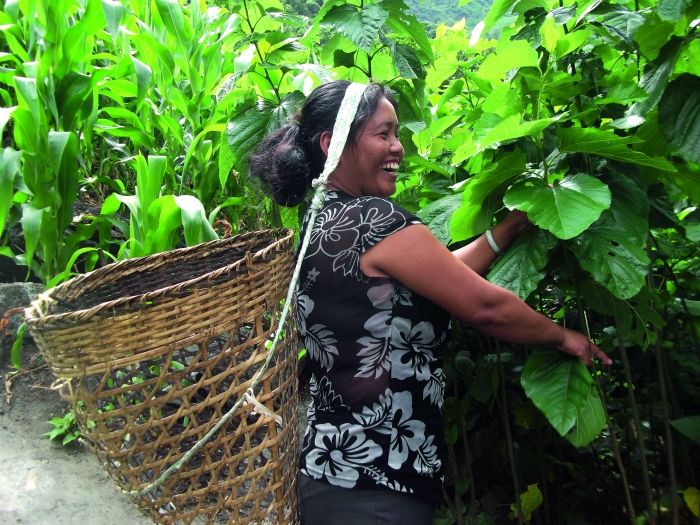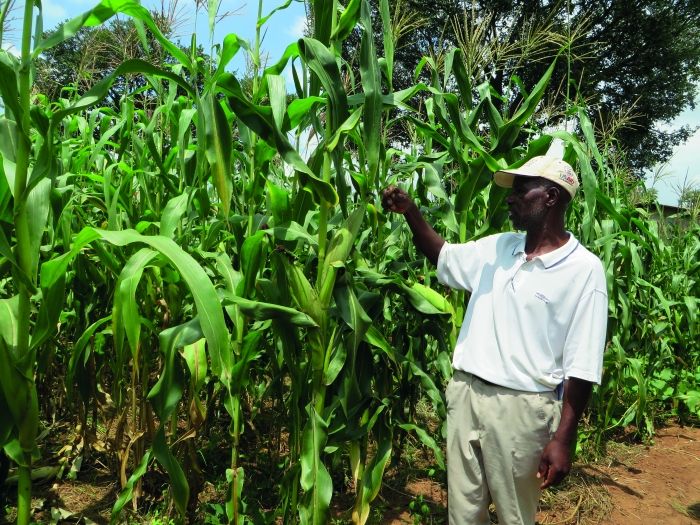Cause no harm

Cause no harm
5 June 2016
Children in the Democratic Republic of Congo eat a paste made from the ground leaves of the moringa tree. Moringa (also known as the miracle tree) has leaves which are rich in nutrients and can be effective in stopping malnutrition. Growing these trees helps with reforestation efforts and reduces the effects of carbon emissions.
The Salvation Army’s historical venture into the business of buying and selling tea is reflected in the lyrics of a song from the 1960s Salvation Army musical Take-Over Bid: “Oh, there’s nothing like an Army cup of tea ...” went John Gowans’ lyric. “They produce it on the spot from Hong Kong to Aldershot. Oh, there’s nothing like an Army cup of tea!”
As far back as 1898, Commandant Herbert Booth launched the Missionary Tea League whereby members pledged only to drink tea supplied by Salvation Army operations in India and Ceylon (now Sri Lanka), under the brand name Hamodava – a Singhalese word for “Salvation”. Simultaneously, The Salvation Army purchased land in South Asia and employed indigenous tea farmers; an innovative foretaste of the Fair Trade concept, perhaps.
I’ve never been to Aldershot, but I recently visited Hong Kong, and my visit there reignited concerns about such ventures and their importance as part of the Army’s holistic international ministry. Perhaps you prefer coffee to tea but, whatever your preference, please allow me to outline the background to my interest. Every year, I grow tomatoes in a little plot of land behind my house. Last year’s crop failed to ripen, the tomatoes remaining green and then turning black – I couldn’t even use them for chutney! I am reliably informed that global climate change had affected many other tomato growers too – it wasn’t just my efforts that failed. In 2015, here in the United Kingdom, we experienced bouts of unusually warm weather during winter, resulting in the early flowering of some plants.
Thankfully, those changes don’t affect me too much. I am fortunate enough to be able to get replacement tomatoes from the supermarket and even buy chutney to my heart’s content, but for others, globally, such alterations in temperature and crop management can have a significant impact on income and lifestyle. The tea farmer in India, or the coffee farmer in Uganda, for example, might lose entire crops because an unpredictable climate has altered flowering patterns drastically. Or a Kenyan farmer can be devastated when the maize seed she planted withers and dies because the rains don’t fall.
Tuvalu’s Permanent Representative to the United Nations, Aunese Simati, talks about the need to secure safe places for displaced families: “You often hear people say to move to higher ground or to move inland. In Tuvalu’s case,” he explains, “there is no higher ground as we are an atoll nation, just over two metres above sea level. We don’t have the luxury of higher grounds. If you move inland, you hit the other side of the island. The highest building is the three-storey government building in Funafuti, which is used as an evacuation centre in times of natural disaster.”
Climate change
The media is overwhelmed with reports of increasing environmental migration by people fleeing drought or flood. The stark reality is, plants and animals – vital food sources – are becoming extinct or unsustainably rare. Disasters seem to be more frequent. Quite probably, we could all relate one story or another of strange weather patterns locally, nationally or internationally.
The Intergovernmental Panel on Climate Change stated that this planet’s surface temperatures increased by 0.85 degrees Celsius between 1880 and 2012, and that this was most likely due to increased greenhouse gas emissions. This has led to warming of the oceans, melting of ice sheets, glaciers and Arctic sea ice, sea level rises, and more extreme weather events. This warming is predicted to rise if we continue to emit greenhouse gases at present rates. Ninety-seven per cent of climate scientists agree that humans are causing this climate change. Psalm 24:1 tells us: “The earth is the Lord’s, and everything in it.” The apostle Paul reminds us that “all things have been created through him and for him. He is before all things, and in him all things hold together” (Colossians 1:16-17). When God created the world he said that it was good and beautiful (Genesis 1:31). He entrusted this world to our stewardship (Genesis 1:28).

Dulia, from Yunnan province in China, harvests mulberry leaves to feed silkworms. As part of a Salvation Army project, mulberry trees were planted along the river instead of maize, which has shallow roots and is pulled up every year, leading to landslides when the rains come. The mulberry trees have good root systems and are left in place from year to year. Since the trees were planted there has been a noticeable reduction in landslides.
Tragically, we have exploited it with our tendency towards a mindset of grabbing and growing without sufficient thought of reasonable limitations or the effects of such development and growth.
As God’s people, Bible believers, do we maybe need to revisit the idea that Planet Earth is our shared home? Is it possible we have neglected that concept, to the catastrophic detriment of innocent others? We human beings are interconnected; we cannot therefore pick and choose which parts of our behaviour we prefer without strong consideration of how that behaviour impacts the lives of individuals, families and entire communities whose needs are already great. It has been said it is only the sick bird that will soil its own nest. Human beings, uniquely, have soiled this stunningly beautiful and intricately complex planet.
It is not without significance that the words “ecology” and “economy” have a common root which means “housekeeping”. The implication is obvious! We cannot separate ecology and economy; neither may we continue to make decisions about what we buy or how we live on the basis of cheapest options or largest profits. In terms of ecology, that is a spectacularly dangerous economic philosophy. Frankly, someone, somewhere, will bear that cost of our decisions, and pay the price. Awfully, it is often those who can afford it least who bear the burden of shoddy housekeeping not of their making.
Urgent issues
The maxim – the golden rule – must be: how will this affect others? Where, for example, does the chain of manufacture and purchase begin, long before I buy, say, a cheap pair of jeans? In an unregulated sweatshop in Bangladesh? How might my purchases affect generations who follow me?
Have you ever stayed in a guest house or hotel (or visited a Salvation Army hall!) where there is a notice on display requesting that the kitchen/ bathroom/toilet be left as you yourself would like to find it? It’s not such a bad rule of thumb for dear old Planet Earth, and it only requires a modicum of thought beforehand.
So when we in the International Projects Section – and many other Salvation Army development workers around the world – work with conservation agriculture, for example, we work to leave a healthy/healthier earth in our wake. When we support agroforestry projects, intercropping, bee-keeping, caterpillar-raising (caterpillars are a cheap and tremendous source of protein!); when we encourage an increase in biodiversity and a decrease in the use of artificial pesticides, I believe we co-labour with God the Creator to care for this earth. We also seek to mitigate against the inevitability of future disasters caused by climate change.

Honest Gudu, a farmer in Kenya, with his maize crop which has been grown using conservation farming methods. These methods help to keep the structure of the soil healthy, moist and weed-free. They help farmers to withstand the negative effects of longer dry seasons and unexpected rains.
Thankfully, governments worldwide are (at last!) starting to take these urgent issues seriously. Last year, in Paris, representatives of 200 countries came together for intense discussion and agreed an encouraging and heart-warming deal on the environment. They made a commitment to reduce carbon emissions and to regularly review the progress of their plans. Finance will be provided to poor nations to help them cut emissions and cope with the effects of unusual and extreme weather. Countries affected by climate-related disasters and problems will be granted crucial financial and practical aid. Thank the Lord for such political will and action. Pray for more!
The renowned economist E.F. Schumacher said: “We still have to learn to know how to live peacefully, not only with our fellow person, but also with nature itself, and, above all, with those higher powers which have made nature and have made us; for assuredly we have not come about by accident and certainly have not made ourselves.”
Ultimately, whether or not the planet is significantly enriched by our being here, is it not perfectly logical for Christians to want to live in such ways that cause no harm to those with whom we share this existence? If righteousness for righteousness’ sake is sometimes our only motto and incentive, is not living simply so that others may simply live a sane and sapient mandate?
Martin Luther said: “Even if I knew that tomorrow the world would go to pieces, I would still plant my apple tree.” What will we plant today, literally and metaphorically, for good or ill?
Go to the World Environment Day website for further information about climate change.
This story first appeared in the April-June issue of All The World.
Comments
No comments yet - be the first.